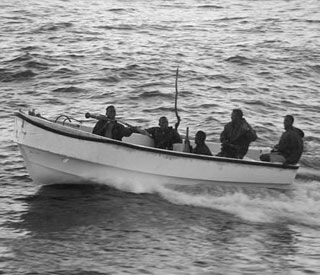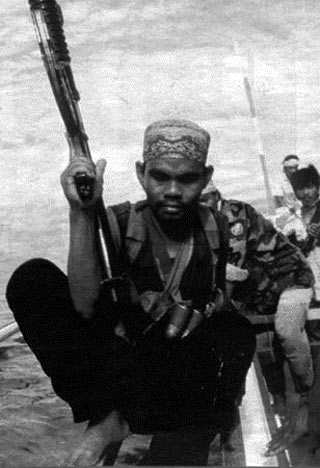Pirates, Bankers, Libertarians
by Michael I. Niman
For Ron Paul’s growing legion of dope-addled contradictarian libertarians, Somalia is like nirvana. There are no taxes. No public education. No national healthcare. No national debt.

No labor laws. No environmental laws. No business regulations. No unions. No import or export restrictions. No meddlesome big government—or small government for that matter. And everyone smokes khat, which is a leafy plant that temporarily deludes its users into feeling as if their problems are gone. Somalia, a country that hasn’t had an operating central government since 1991, is a libertarian Republican’s wet dream, where entrepreneurs can grow their businesses unfettered by laws and regulations.
Out of this brave new old world of unbridled capitalism, 21st-century Blackbeards have emerged, shoeless gangstas doing it Somali style on the high seas, making monkeys out of the world’s richest states and most powerful navies. A Vanity Fair story about a hijacking of a French luxury cruise ship described those Somali pirates as being “scrawny” and “dressed in rags.” One had his pistol tied to his trousers by a lanyard so he wouldn’t lose it if he dropped it, much like a parent tying mittens to a preschooler. Welcome to a wild, weird new century.
I’m kind of torn watching all this pirate drama unfold. The anarchist in me is charmed by the specter of some of the poorest and hence most powerless people on earth throwing a wrench into the machine, demanding recognition as people the world can no longer ignore. But they’re pirates. And I don’t like pirates. Maybe it’s all those silly Johnny Depp wannabe Disney clones living in their parents’ basements argh arghingon the internet. Or maybe it’s just my own anger at the prospect of anyone boarding my canoe and trying to tell me how or where to paddle. In any case, I don’t have patience for pirates, whether they’re costumed clowns, khat-smoking Somalis, or pothead Republicans.
So I have to admit that my ire was up when pirates seized the Maersk Alabama, which was the first American-flagged ship captured by pirates on the high seas in more than 200 years. Part of my anger stemmed from the fact that what the pirates seized was a humanitarian aid shipment bound for starving Somalis. Once they realized this, they should have apologized and left peaceably. In any event, I knew the pirates fucked up. The United States Government doesn’t pay ransom to thugs—that is, of course, unless they’re bankers or insurance companies holding our entire economy hostage.
If the US allowed a ransom to be paid for the safe return of the captain of the Maersk Alabama, no American would be safe traveling anywhere. People are not commodities that can be stolen and bought back. It is not acceptable to point guns in people’s faces. It is not acceptable to kidnap people, to steal them like slaves to be bartered. I followed this story closely and was truly happy to see the captain liberated, and not terribly concerned about the fate of the people who were promising to kill the unarmed captain. These were not sweet, gentle people. And they’re not the poor, scrawny youngsters described by Vanity Fair. I’ll explain more about this in a moment. This story, like most things I write about, is a lot more complicated than it first appears.
It turns out there were a lot of pirates plying the Gulf of Aden and the Indian Ocean long before starving Somalis took to their battered skiffs with rifles and machetes.
There’s a reason why the Maersk Alabama was the first American ship seized by pirates in two centuries. Ninety percent of internationally traded goods are transported on approximately 50,000 freighters and tankers, but putting aside domestic and Great Lakes shipping, only about 200 of these ships are registered to the United States and staffed by Americans. Today’s ships are registered under “flags of convenience,” exempting their multinational corporate owners from taxes and environmental and labor regulations. These corporate pirates, hiding behind a rainbow of colorful Jolly Rogers, have netted hundreds of millions in booty by underpaying workers, skimping on safety and sanitation, and evading taxes to governments that we the people otherwise have to shoulder the burden of supporting.
One thing that US ship registration fees pay for is the protection of the US Navy. Panama, the number one nation for ship registry, has a small naval force which they use for patrolling their own coast, mostly enforcing fishing regulations and ignoring drug traffickers. The second largest shipping fleet in the world is registered to Liberia, which has a small coast guard base but saw most of its small boats sunk when rebels overran its capital in the 1990s.
Needless to say, it’s not Liberia or Panama that are out on the high seas spending money rescuing Liberian and Panamanian flagged vessels. These corporate pirates, however, could have happily sailed the waters off the coast of Somalia for another 200 years—had not another group of pirates come on the scene.

The nastiest pirates to ply the Somali coast in recent years haven’t been Somalis: They’re Europeans. This all goes back to the Ron Paul libertarian Republican utopia. When Somalia’s government fell in 1991, making Somalia a free-market free-for-all, it opened the door for all sorts of exploitation on the lawless coast. No government meant that Somalia, unlike even Liberia with its silly coast guard base, and Panama with its tiny navy, had no means to protect its fisheries and its environment. Hence, shortly after the fall of the government, European-flagged fishing trawlers starting recklessly harvesting what the London-based Independent reports as more than $300 million per year in tuna, shrimp, and lobster, mostly destined for the European market. This dollar amount, incidentally, far surpasses anything the Somali pirates have so far been able to extract from global shippers.
Unregulated by Somali government, the European pirates maximized resource exploitation, wiping out local fisheries in a ruthless quest for a salable harvest. With the local fisheries went the local fishing industry. To add insult to injury, the European drift nets not only wreaked havoc on the local ecosystem, which no doubt was already overfished by Somalis, but also regularly caught small Somali fishing vessels.
After European fish pirates successfully tested the Somali coastline for weakness, a new type of European pirate followed in their wake—this time using the Somali coast as a toxic and radioactive waste dump. The Independent quotes the United Nations envoy to Somalia as reporting not only that “Somebody is dumping nuclear waste here,” but “there is also lead, and heavy metals such as cadmium and mercury” showing up in Somalia’s coastal waters. In 2005, more than 300 coastal residents died from radiation sickness after leaking barrels of radioactive waste started washing ashore. Much of the toxic waste found on the Somali coast is traceable to European hospitals and industrial facilities.
It’s against this backdrop that a third wave of pirates emerged in Somali waters. There are now many reports of desperate Somali fishermen, earlier in this decade, venturing out to confront the European trawlers that were destroying their fisheries, and to hunt for the pirates who were dumping toxic waste into their waters. At first, they seized fishing trawlers, demanding outrageous “fines” from the owners. The owners quickly paid the ransoms, writing them off as a cost of doing business. Emboldened Somalis starting grabbing bigger boats and demanding larger ransoms, which shippers easily paid. This quickly drew the attention of Somalia’s criminal gangs, who now control the multi-million dollar piracy industry, while, intentionally or not, driving the European poachers out of Somali waters.
These new Somali pirates—essentially the fourth wave of pirates to ply the Somali coast during the past decade—increasingly, like the corporate pirates they prey on, represent big business. The people boarding the boats often work for investors back on shore who arm them, equip them, and provide them with chase boats. Their relationship with shippers, at least until this week, has been somewhat symbiotic. The costs of ransoms have been absorbed through higher insurance rates—paid to pirates like AIG—which in turn are passed on as shipping surcharges. Both the insurance and shipping companies continue to take their margins from these newly inflated grosses, with the additional revenue dwarfing the amount actually paid out to Somali pirates, be they fishermen or well financed, conglomerated thugs.
Last week’s attack on a US flagged aid ship will end that status quo. The American media suggested that our president’s honor and manhood had been challenged. That threat ended with the killing of three Somali pirates. During the four-day ordeal, however, we got a break from soaring unemployment, collapsing industries, toxic debt, global warming, Mexican drug wars, and the general breakdown of society. For four days we got to go back to a simpler time—the 1730s, to be specific—and a good old-fashioned shootout with buccaneers. Three skinny kids born into a chaotic violent collapsed society were shot dead by the world’s most powerful military, and the Obama presidency was saved. It’s a weird world for sure.
The Somali pirates, for their part, are promising a break from their relatively nonviolent past, with lots of talk about a new future predicated on the wholesale execution of captives—in short, terrorism. This is a bad business plan, but so was attacking one of the only US-flagged cargo ships on earth.
Killing pirates, it turns out, is a good political move. President Obama, in the eyes of an amoebic media, is now a decisive leader ready to take those 3am phone calls Hillary Clinton and John McCain warned us about. He allowed pirates to be shot. He’s a real leader.
Now that he’s cut his teeth, faced that first ritualistic bloodletting of a US president, and experienced the power and prestige that comes from defeating pirates, perhaps it’s time to take on real, big-league pirates. Perhaps it’s time to deal with the pirates on Wall Street who have been holding our economy hostage. Maybe, if they run, we’ll even pursue them to their Somalia-like offshore tax havens.
Maybe. But I’m not holding my breath. When it comes to pursuing criminals, we like to think small.
Dr. Michael I. Niman is a professor of journalism and media studies at Buffalo State College. His previous Artvoice columns are available online at www.artvoice.com, archived at www.mediastudy.com and available globally through syndication.
blog comments powered by Disqus
|
Issue Navigation> Issue Index > v8n16 (Week of Thursday, April 16, 2009) > Pirates, Bankers, Libertarians This Week's Issue • Artvoice Daily • Artvoice TV • Events Calendar • Classifieds |









 Current Issue
Current Issue